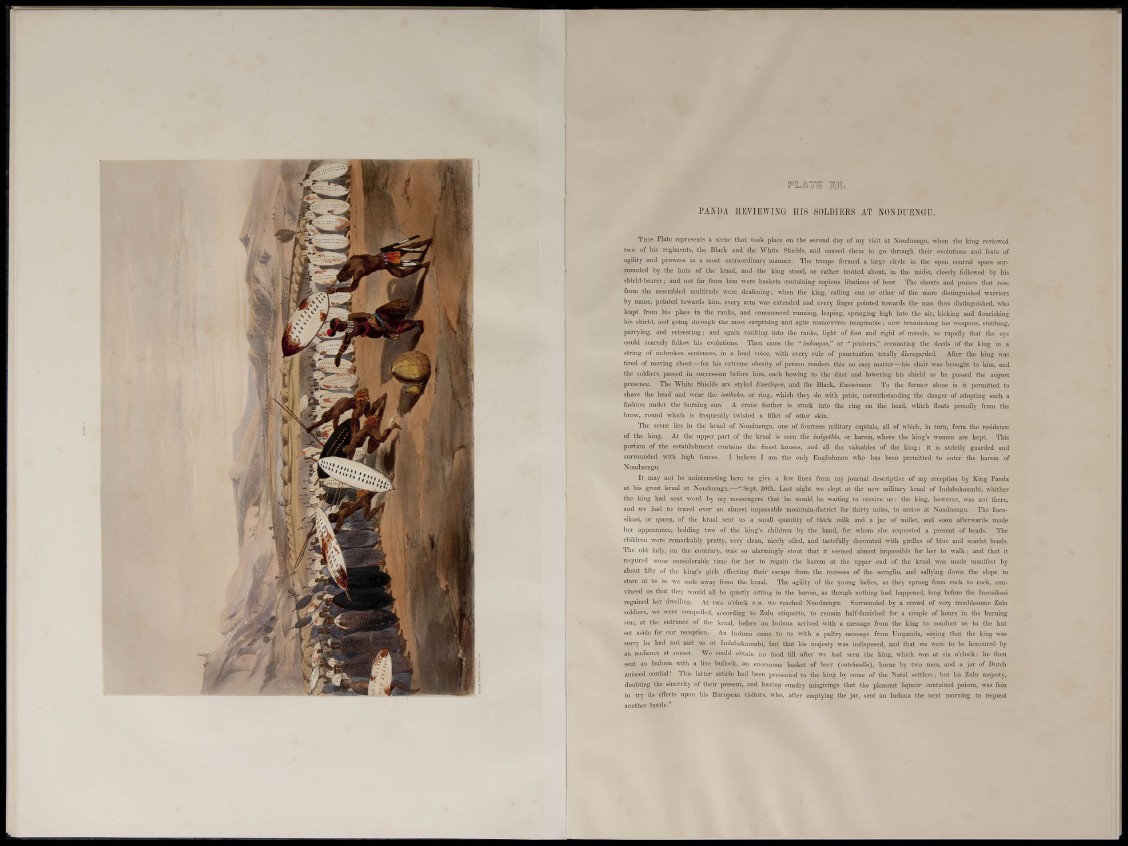
[ P I L A T l mWo
PANDA KEYIEWING HIS SOLDIERS AT NONDUENGU.
T u t s Plate represents a scene that took place on the second day of my visit at Nonducngu, when the kii);,^ reviewed
tT\-o of his regiments, the Black and the White Shields, and caused them to go through their evolutions and feats of
agility and prowess in a most extraordinai-y manner. The troops formed a large circle in the oi>en central space surrounded
by the huts of the kraal, and the king stood, or rather trotted about, in the midst, closely followed by his
shield-bearer; and uot far from him were baskets containing copious libations of beer. The shouts and praises that rose
from the assembled multitude were deafening; when the king, calling one or other of the more distinguished warriors
by name, pointed towards liim, every arm was extended and every fiuger pointed towards the man thus distinguished, who
leapt from his place in the ranks, and commenced running, leaping, sprmging high into the air, kicking and flourishing
his shield, and going through the most surprising and agile manojuvi'es imaginable; now brandishing his weapons, stabbing,
parrying, and retreatmg; and again vaulting into the raiJcs, light of foot and rigid of muscle, so rapidly that the eye
could scarcely follow his evolutions. Then came the " mhongai," or " praisers," recounting the deeds of the king in a
string of unbroken sentences, in a loud voice, with every rale of punctuation totally disregarded. After the king was
tired of moving about—for his extreme obesity of person renders this no easy matter—his chair was brought to him, and
the soldiei-s passed hi succession before him, each bowing to the dust and lowering his shield as he passed the august
presence. The White Shields are styled Emetlopes, and the Black, Emeniamas. To the former alone is it permitted to
shave the head and wear the issikoko, or ring, which they do with pride, notwithstan<ling the danger of adopting such a
fashion under the burning sun. A crane feather is stuck into the ring on the bead, which floats proudly from the
brow, round which is frequently twisted a fillet of otter skin.
The scene lies in the kraal of Nonduengu, one of fourteen military capitals, all of which, in turn, form the residence
of the king. At the upper pai't of the kraal is seen the issic/otklo, or harem, where the king's women are kept This
portion of the establishment contains the finest houses, and all the valuables of the king; it is strictly guarded and
surrounded with high fences. believe I am the only Englishman who has been pei-mitted to enter the harem of
Nonduengu.
It may not be uninteresting here to give a few lines from my journal descriptive of my reception by King Panda
at his great kraal at Nonduengu:—" Sept. 20th. Last night we slept at the new military kraal of Indabakaumbi, whither
the king had sent word by my messengers that he would be waiting to receive us; the king, however, was not there,
and we had to trav el over an almost impassable momitain-district for thirty miles, to arrive at Nonduengu. The Incosikasi,
or queen, of the kraal sent us a small quantity of thick milk and a jar of millet, and soon afterwards made
her appearance, holding two of the king's children by the hand, for whom she requested a present of beads. The
children were remarkably pretty, very clean, nicely oiled, and tastefully decorated with girdles of blue and scarlet beads.
The old lady, on the contrary, was so alarmingly stout that it seemed almost impossible for her to walk; and that it
required some considerable time for her to regain the harem at the upper end of the kraal was made manifest by
about fifty of the king's girls effecting their escape from the ]-ecesses of the seraglio, and sallying down the slope to
stare at us as we rode away from the kraal. The agility of the young ladies, as they sprang from rock to rock, convinced
us that they would all be quietly sitting tn the harem, as though nothing had happened, long before the Incosikasi
regained her dwelling. At two o'clock -. . we reached Nonduengu. Sun-ounded by a crowd of very troublesome Zulu
soldiers, we were compelled, according to Zulu etiquette, to remain half-famished for a couple of hours in the burning
sun, at the entrance of the kraal, before an Induna arrived with a message from the king to conduct us to the hut
set aside for our reception. An Induna came to us with a paltry message from Umpanda, saying that the king was
sorry he had not met us at Indabakaumbi, but that his majesty was indisposed, and that we were to be honoured by
an audience at sunset. We could obtain no food till after we had seen the king, which was at sis oclock: he then
sent an Induna with a live bullock, an enormous basket of beer (outchualla), boi-ne by two men, and a jar of Dutch
aniseed cordial! This latter article had been presented to the king by some of the Natal settlei-s; but his Zulu majesty,
doubting the sincerity of their present, and having sundry misgivings that the pleasant liqueur contained poison, was fain
to tiy its eiFects upon his European visitors, who, after emptying the jar, sent an Induua the nest morning to request
another bottle."